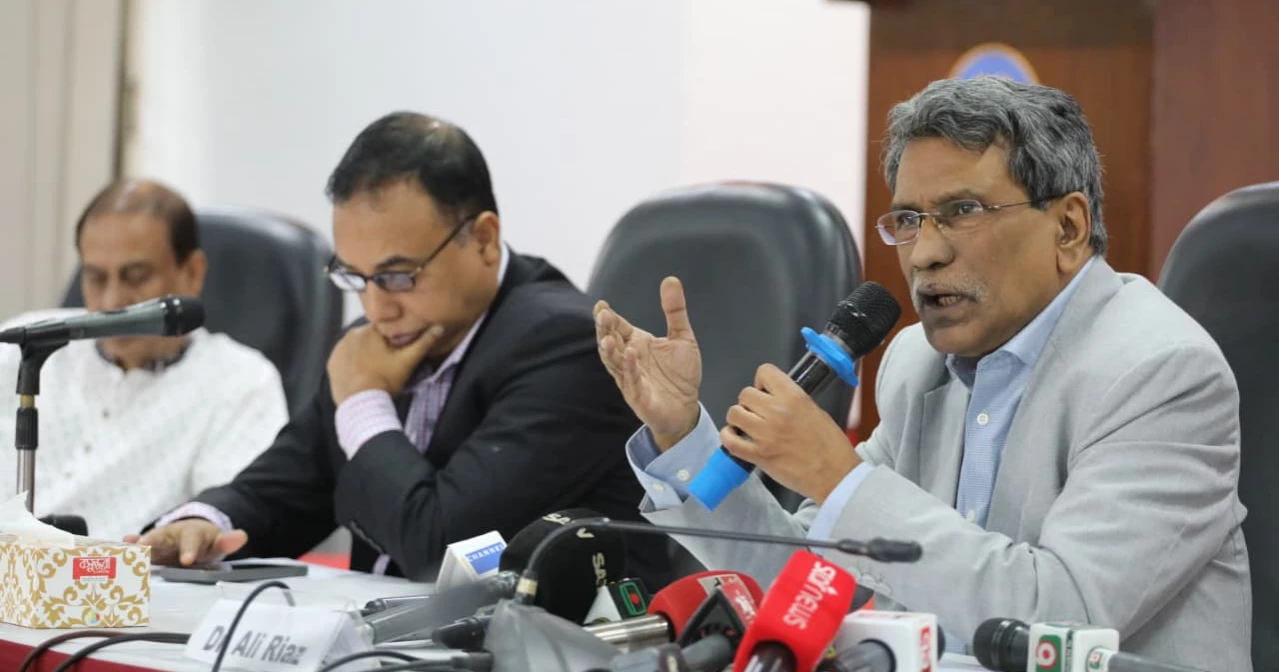Speakers at a dialogue on Wednesday stressed the urgent need for genuine media freedom and high-quality journalism free from political or personal bias, warning that harassment, tagging, and fascist tactics persist even in the current relatively freer media environment.
They underscored that journalists must be empowered with absolute—not ad-hoc—freedom, as well as dignity and financial security, to help them resist greed or partisan pressures. The speakers also called on the interim government to take concrete steps towards these reforms during its remaining six months in office, reports UNB.
The Centre for Governance Studies (CGS) organised the dialogue session at the CIRDAP Auditorium on Wednesday to discuss ongoing challenges and proposed reforms in the mass media sector.
Dr Ali Riaz, Head of the Constitution Reform Commission and Vice Chairman of the National Consensus Commission, and Matiur Rahman Chowdhury, Editor-in-Chief of Manab Zamin, attended as guests of honour.
Other participants included Advocate Subrata Chowdhury, Executive President of Gono Forum; Professor S. M. Shameem Reza, Department of Mass Communication and Journalism, University of Dhaka; Parvez Karim Abbasi, Executive Director of CGS; Rezwanul Haque Raja, Editor-in-Chief of Maasranga Television and Chairman of the Broadcast Journalist Center; Reaz Ahmad, Acting Editor of Dhaka Tribune; Dr Moudud Hossain Alamgir Pavel, Convener of BNP Media Cell; Asif Bin Ali, PhD candidate at Georgia State University; Mahbub Morshed, Chief Editor and Managing Director of Bangladesh Sangbad Sangstha (BSS); Mahmuda Habiba, Joint Secretary General of Jatiyatabadi Krishak Dal and BNP Media Cell member; freelance journalist Kazi Jesin; Manjurul Islam, Executive Editor of Bangladesh Pratidin; senior journalist Zahid Newaz Khan; and Supreme Court advocate Barrister Shihab Uddin Khan. CGS President Zillur Rahman moderated the session.
Dr Ali Riaz emphasised the need to define who qualifies as media. “Sometimes I ask journalists to stand in front of a mirror and ask themselves: Are you a journalist or a politician?” he said, referring to the type of journalism seen during the July movement.
Matiur Rahman Chowdhury said unhealthy politics has engulfed the media and true freedom is conditional. “Yes, we are free—but only when it goes in your favour. If it goes against you, we fear mob violence,” he said, adding that many journalists lost their jobs while unions remained silent.
He expressed disappointment in the interim government, saying, “We had high expectations from (Chief Adviser) Prof Muhammad Yunus. But if the current media reform recommendations are all we can expect, then even in the next hundred years they won’t be implemented.”
Zillur Rahman noted the formation of several committees by the government, including those for Bangladesh Betar and Television autonomy and a new Press Council. “But none have achieved anything meaningful. Despite the Chief Adviser’s direct instructions, no real progress has been made,” he said.
Advocate Subrata Chowdhury raised concerns over poor pay and benefits for journalists. “How can we expect quality journalism when journalists aren’t compensated fairly? Media freedom and judicial independence seem like a golden bowl made of stone—an impossible paradox,” he said.
Prof Shameem Reza cautioned against placing all responsibility on self-regulation. “Will journalists receive no legal protections? Will injustices and pressure go unaddressed?” he asked.
Parvez Karim said, “While the media is somewhat freer one year after the Monsoon Revolution, harassment and fascist tactics persist. Even constructive criticism of the government invites backlash through social media or pressure groups.”
Rezwanul Haque Raja criticised the government’s failure to implement key recommendations from the Media Commission. “One major proposal was to dissolve the Press Council and form a Press Commission. Instead, the Council was merely restructured,” he said.
Reaz Ahmad said the Press Council is effectively defunct. “If it functioned properly, people wouldn’t be arrested under the ICT Act, Digital Security Act, or Cyber Security Act,” he said.
Asif Bin Ali discussed how political parties treat media as part of the political economy. “It’s not about who is in power. Though figures like Salman F Rahman or Mosaddek Hossain Falu may have stepped back, new names will emerge,” he warned.
Mahbub Morshed criticised the Media Reform Commission for ignoring the Wage Board. “Proposing a ninth-grade government salary as a starting wage for journalists was unethical,” he said. “This report served corporate interests, not journalists. Legal protections weren’t even considered.”
Mahmuda Habiba echoed the need for financial support and protections for journalists given the risky nature of their work. She stressed that the Media Commission must be empowered to enforce its own laws if real change is to occur.


